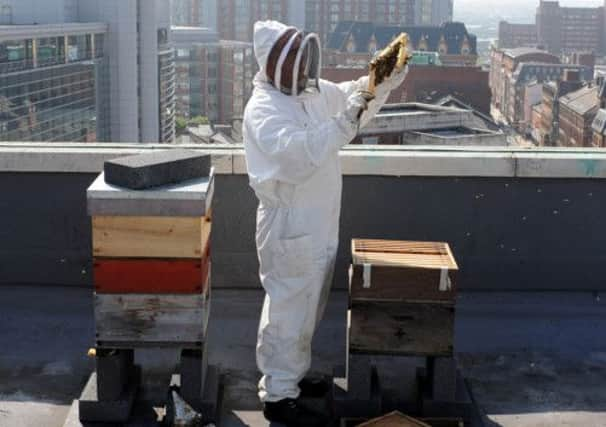Hives that are buzzing off on holiday for a break on the moors


Some people take their pets on holiday with them; not many would think of packing off a few thousand bees for a little rest and relaxation.
However, the Leeds Beekeepers Association is a forward thinking organisation and has just transported various hives to an undisclosed location in the heart of the heather moors near Otley.
Advertisement
Hide AdAdvertisement
Hide AdThe idea is the change of scene will allow the honey bees an opportunity to collect rare heather nectar necessary to make sought-after honey.
“So long as you transport bees more than three miles from their original hive, then they won’t try to return to it,” says Chris Barlow, who together with several colleagues has transported several of his hives – each containing around 50,000 bees. “We have been in touch with a number of landowners up in the Otley area and they have agreed to allow the bees on their land.
“The idea is that they get to collect heather nectar, which is totally different to the kind they are used to collecting. It produces a different tasting honey, one which is much sought after.
“We leave them up there for about a month, so throughout the whole of August.”
Advertisement
Hide AdAdvertisement
Hide AdAlthough taking bees “on holiday” is not a new idea, it is one which is being revived by Leeds Beekeeper Association in a bid to stimulate numbers. At present the honey bee population is in decline, a situation which has worsened in recent years thanks to the introduction of new pesticides called neonicotinoids. Sprayed directly onto plant seeds, they become incorporated in the actual pollen and nectar and are fatal to bees.
The European Union has imposed a two-year ban on the use of neonicotinoids but even so their introduction in the 1980s has taken its toll on the bee population. That, coupled with the loss of natural habitat and an increase in the destructive varroa mite means their numbers have never been lower.
Duncan Brearley, swarm co-ordinator for Leeds, who has been a member of Leeds Beekeepers Association for about seven years, said: “Taking the bees on holiday, as it were, is something the members have been talking about for a while. It is something which used to happen years and years ago but we have now revived it.
“It’s not something which can be done willy nilly, you have to plan properly for it and you almost have to pack the bees’ bags, in a sense, in that you have to prepare the colony for being transported and we make sure all that goes ahead smoothly in terms of making sure the hive is properly sealed up and so on.”
Advertisement
Hide AdAdvertisement
Hide AdThe former sub-postmaster, who thinks nothing of being stung by his honeybees, added: “What we would really like to see is more people becoming interested in keeping bees. Beekeepers are, like bees, in decline and the reality is that 70 per cent of what you eat is dependent on bees.
“Bees do such an important job in terms of pollinating plants and yet their numbers are in serious decline. Anything we can do to help them thrive and survive is good for everybody.”
The Leeds Beekeepers Association, which is based at Temple Newsam will be running a beekeeping course this winter and is keen to encourage people who might be interested to join it.
Mr Brearley said: “Anyone who has an interest in keeping bees is welcome to come down and talk to us. We have a good relationship with local landowners, where the bees are kept.”
Contact www.leedsbeekeepers.org.uk.